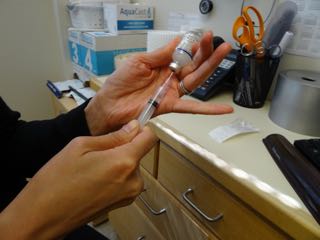Cortisone injections

Cortisone is a hormone released by the adrenal gland in response to stress. It is a potent anti-inflammatory agent. Synthetically produced cortisone is more potent and longer acting than natural cortisone and is used for diagnosis as well as treatment of a variety of musculoskeletal conditions such as tendinopathy, bursitis and arthritis.
Cortisone can be injected directly into the affected joint or around an affected tendon to relieve pain and reduce inflammation. Cortisone injections produce a significant reduction in pain and inflammation in a majority of cases. It takes about a week for the cortisone injection to produce any effect. There can be increased soreness for a day or two following the injection, so we recommend taking it easy for a few days following a cortisone injection. Some conditions respond better to cortisone to others. In some conditions, such as trigger fingers, cortisone injections can result in a cure. In others, such as arthritis, the response to cortisone is temporary. “Temporary” is variable from one patient to the next. For rare patients, cortisone simply does not work.
Cortisone injections offer significant relief in pain & inflammation however is associated with certain adverse effects. The most common side effect of cortisone injection is a “cortisone flare”, a condition where cortisone crystallizes in the injected area and causes severe pain. It usually occurs in the first 24-48 hours after the injection and lasts for a couple of days. It can be managed with the help of ice packs and analgesics. Other adverse effects associated with cortisone injection may include:
- Infection at the injection site: It is a rare but serious complication and may be associated with fever along with pain and swelling at the injection site. Antibiotics may be prescribed for the management of infection.
- Transient elevation in blood sugar in patients with insulin dependent diabetes: This may last for up to 10 days. Diabetics should consult their doctor before the procedure for temporary modification of their medication. Blood sugars should be monitored closely for 7-10 days following a cortisone injection.
- Redness and flushing of the face: This may occur on the second or third day of the procedure and may last for about 7 days. Antihistamines can be used if the redness fails to resolve.
- Superficial injection may be associated with localized skin and subcutaneous fat atrophy as well as hypo-pigmentation (whitening of the skin) at the injected site.
- Prolonged high dose steroid therapy may be associated with avascular necrosis of the head of the femur or humerus.
In case of any adverse reaction contact your doctor immediately. Dr. Yu generally limits cortisone injections to 3 injections for any given body part – lifetime. After a third injection, if symptoms persist, other treatments should be considered, including possible surgery. For some conditions, such as carpal tunnel syndrome, Dr. Yu will give only 1 injection.




